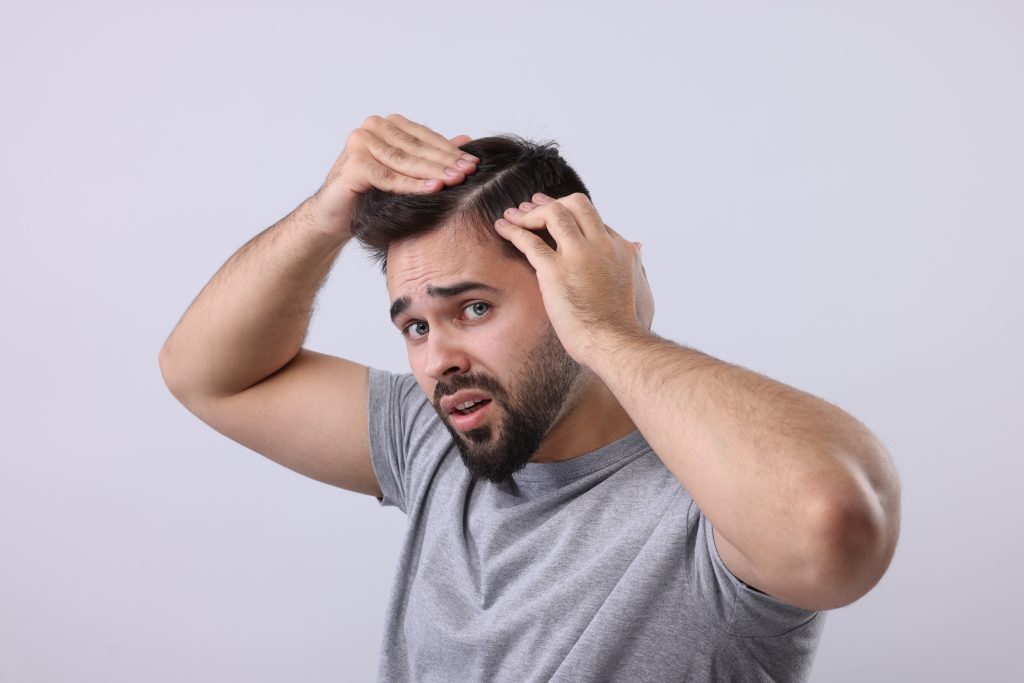Ever noticed more hair falling out during stressful times? You’re not imagining it. Stress doesn’t just affect your mood; it can show up physically, too, and hair loss is a common one.
While stress alone isn’t always to blame, it’s often part of the mix when it comes to sudden thinning or shedding. Stress and hair loss often go hand in hand, especially after illness, burnout or emotional upheaval.
If you’ve been wondering whether the two are linked, you’re not alone, and it’s worth understanding why it happens.
How Stress Affects the Hair Growth Cycle
Hair grows in phases: anagen (growth), catagen (transition), and telogen (rest and shedding). Normally, most hairs stay in the growth phase, but stress can disrupt this rhythm. When the body’s under pressure, more hairs may shift into the telogen phase too soon, leading to sudden shedding.
This reaction, known as telogen effluvium, often shows up a few months after a stressful event. It can be surprising when it happens, but it’s your body’s way of responding to strain, and thankfully, it’s usually temporary once things settle down.
The Role of Cortisol in Hair Loss
Cortisol, often called the “stress hormone,” rises when you’re under pressure, physically or emotionally. While it’s part of your body’s natural response to stress, too much over time can affect other systems, including your hair. Some studies suggest high cortisol levels may disrupt the normal hair growth cycle or weaken follicles, potentially causing more shedding.
That said, research is still ongoing. The link between cortisol and hair loss isn’t fully confirmed, but if you’ve been under stress and noticed changes, cortisol could be one piece of the puzzle.

Common Types of Stress-Related Hair Loss
Not all hair loss is the same, and stress can show up in a few different ways when it comes to your scalp. Here are the three most common forms that might be triggered or worsened by emotional or physical stress:
- Telogen Effluvium
Probably the most common stress-related type. It happens when a larger number of hair follicles suddenly shift into the resting (telogen) phase, leading to noticeable shedding. This usually shows up two or three months after a stressful event like illness, surgery, or emotional shock. - Alopecia Areata
An autoimmune condition where the body’s immune system mistakenly attacks hair follicles, causing round patches of hair loss. While it’s not caused by stress, high-stress events are thought to be potential triggers in people who are already predisposed. - Trichotillomania
A stress-related behaviour where someone feels an intense urge to pull out their own hair, usually from the scalp, eyebrows, or eyelashes. It’s not a biological cause of hair loss, but it’s often linked to anxiety, tension, or emotional distress.
Impact of Chronic Stress on Scalp Health
It’s easy to focus on the hair itself, but your scalp plays a big role in how well your hair grows. Chronic stress may reduce blood flow to the scalp, limiting the nutrients and oxygen your hair follicles need to stay healthy.
It can also worsen dryness, itchiness, or flare-ups like dandruff, not direct causes of hair loss, but not helpful either. When the scalp is under strain, it’s harder for hair to grow well. So, stress doesn’t just affect how you feel; it affects the foundation of your hair, too.
Ways Stress Can Trigger Hair Thinning
Stress doesn’t always come from a single moment; sometimes, it builds slowly in the background. And over time, that strain can show up in unexpected places, including your hairline.
Here are a few situations where stress and hair loss often go hand-in-hand:
- Work burnout – long hours, deadlines, and constant pressure can leave your body running on empty.
- Illness or surgery – physical recovery takes a toll, and so does the emotional side of healing.
- Grief, breakups or big life changes – emotional upheaval can disrupt sleep, appetite, and general well-being, all of which affect hair health.
And then there are things like poor diet, hormonal shifts, or lack of rest. Stress doesn’t cause these on its own, but it definitely tends to make them worse. It’s often a mix of factors, not just one.
When to Seek Support for Hair Concerns
If you’ve been noticing more hair in the shower drain or on your pillow lately, it’s worth checking in, especially if it’s been going on for a while. Hair loss can feel overwhelming, but you don’t have to figure it out alone.
A qualified healthcare professional can help look at the bigger picture, not just your hair, but your overall health, lifestyle, and any possible triggers. And because everyone’s experience is slightly different, support should always be personal.
Early advice often leads to better outcomes and some peace of mind, too.
How WePrescribe Supports Individuals with Hair Loss Concerns
If stress and hair loss are starting to feel linked for you, getting support should be simple and private. At WePrescribe, you can complete an online consultation with a qualified prescriber, all from the comfort of home.
There’s no waiting room, no awkward pharmacy counter, just straightforward advice and access to treatment where appropriate. If medication is a suitable option, it’ll be delivered discreetly to your door.
For those who prefer to speak to someone directly, you’re welcome to contact us to ask a question or find out more about how it works.
To explore treatment options, visit our hair loss medication page and see what might fit your needs.
Managing Stress Alongside Hair Concerns
Tackling stress and hair loss together might sound like a lot, but even small changes can help. Managing your stress levels won’t just support your mental health; it could also give your hair a better chance to recover.
Here are a few habits worth exploring:
- Sleep – aim for regular, good-quality rest where possible
- Mindfulness – breathing techniques or short meditation sessions can lower tension
- Movement – daily walks or light exercise help process built-up stress
- Talking – whether it’s a friend, therapist or GP, opening up makes a difference
Looking after your wellbeing isn’t just a bonus, it’s often the first step in helping your body (and your hair) feel stronger again.

If you’ve noticed your hair changing and think stress might be playing a part, you’re not overthinking it, and you’re definitely not alone. Speaking to a healthcare professional can help untangle the cause and offer options that make sense for you. Whether it’s temporary shedding or something more persistent, there’s always a way forward.
Taking that first step, even just to ask a question with us here at WePrescribe, could make things feel a lot more manageable.


